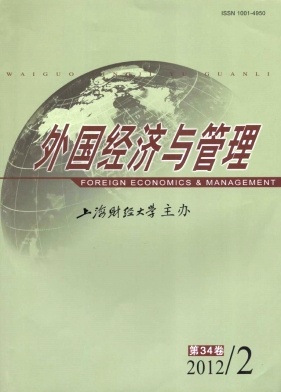组织非常规偶发事件认知研究评介与展望
外国经济与管理 2012 年 第 34 卷第 02 期, 页码:35 - 42
摘要
参考文献
摘要
本文从非常规偶发事件的认知视角界定、认知反应模式、认知前因与结果等方面对国外非常规偶发事件的组织认知研究进行了回顾;在此基础上,结合我国本土情境下非常规偶发事件及相应组织认知的特征对后续本土化研究进行了展望。
③资料来源:Swiss Re.Natural catastrophes and man-made disasters in 2008.Sigma,NO.2,2009。
④美国宾夕法尼亚州立大学的Garud教授持这种观点,参见年:会议发言纪要。
[1]Argote L and Miron-Spektor E.Organizational learning:From experience to knowledge[J].Organization Science,2011,22(5):1123-1137.
[2]Barr P S.Adapting to unfamiliar environmental events:A look at the evolution of interpretation and its role in strategic change[J].Organization Science,1998,9(6):644-669.
[3]Beck T E and Plowman D A.Experiencing rare and unusual e-vents richly:The role of middle managers in animating and guiding organizational interpretation[J].Organization Science,2009,20(5):909-924.
[4]Brown A D.Making sense of inquiry sensemaking[J].Journal of Management Studies,2000,37(1):45-75.
[5]Brown A D.Authoritative sensemaking in a public inquiry re-port[J].Organization Studies,2004,25(1):95-112.
[6]Christianson M K,et al.Learning through rare events:Signifi-cant interruptions at the Baltimore&Ohio Railroad Museum[J].Organization Science,2009,20(5):846-860.
[7]Cyert R M and March J G.A behavioral theory of the firm[M].Englewood Cliffs:Prentice-Hall,1963.
[8]Day G S and Schoemaker P J H.Driving through the fog:Managing at the edge[J].Long Range Planning,2004,37(2):127-142.
[9]Garud R,et al.Dealing with unusual experiences:A narrative perspective on organizational learning[J].Organization Sci-ence,2011,22(3):587-601.
[10]Gavetti G.Cognition and hierarchy:Rethinking the micro-foundations of capabilities’development[J].Organization Sci-ence,2005,16(6):599-617.
[11]Gioia D A and Chittipeddi K.Sensemaking and sensegiving in strategic change initiation[J].Strategic Management Journal,1991,12(6):433-448.
[12]Hoffman A J and Ocasio W.Not all events are attended e-qually:Toward a middle-range theory of industry attention to external events[J].Organization Science,2001,12(4):414-434.
[13]Isabella L A.Evolving interpretations as a change unfolds:How managers construe key organizational events[J].Aca-demy of Management Journal,1990,33(1):7-41.
[14]Kaplan S.Research in cognition and strategy:Reflections on two decades of progress and a look to the future[J].Journal of Management Studies,2011,48(3):665-695.
[15]Lampel J,et al.Experiencing the improbable:Rare events and organizational learning[J].Organization Science,2009,20(5):835-845.
[16]Madsen P M.These lives will not be lost in vain:Organiza-tional learning from disaster in US coal mining[J].Organiza-tion Science,2009,20(5):861-875.
[17]Madsen P M and Desai V.Failing to learn?The effects of failure and success on organizational learning in the global or-bital launch vehicle industry[J].Academy of Management Journal,2010,53(3):451-476.
[18]Maitlis S and Sonenshein S.Sensemaking in crisis and change:Inspiration and insights from Weick(1988)[J].Jour-nal of Management Studies,2010,47(3):551-580.
[19]Mills C and O’Connell A.Making sense of bad news:The media,sensemaking,and organizational crisis[J].Canadian Journal of Communication,2003,28(3):323-339.
[20]Narayanan V K,et al.The cognitive perspective in strategy:An integrative review[J].Journal of Management,2011,37(1):305-351.
[21]Ocasio W.Towards an attention-based view of the firm[J].Strategic Management Journal,1997,18(Special Issue):187-206.
[22]Ocasio W.Attention to attention[J].Organization Science,2011,22(5):1286-1296.
[23]Rerup C.Attentional triangulation:Learning from unexpect-ed rare crises[J].Organization Science,2009,20(5):876-893.
[24]Starbuck W H.Cognitive reactions to rare events:Percep-tions,uncertainty,and learning[J].Organization Science,2009,20(5):925-937.
[25]Tripsas M and Gavetti G.Capabilities,cognition,and inertia:Evidence from digital imaging[J].Strategic Management Jour-nal,2000,21(10/11):1147-1161.
[26]Weber K and Glynn M A.Making sense with institutions:Context,thought and action in Karl Weick’s theory[J].Or-ganization Studies,2006,27(11):1639-1660.
[27]Weick K E.Reflections on enacted sensemaking in the Bhopal disaster[J].Journal of Management Studies,2010,47(3):537-550.
[28]Wicks D.Institutionalized mindsets of invulnerability:Differ-entiated institutional fields and the antecedents of organiza-tional crisis[J].Organization Studies,2001,22(4):659-692.
[29]Zollo M.Superstitious learning with rare strategic decisions:Theory and evidence from corporate acquisitions[J].Organiza-tion Science,2009,20(5):894-908.
[30]邓少军,芮明杰.组织动态能力演化微观认知机制研究前沿探析与未来展望[J].外国经济与管理,2010,32(11):26-34.
④美国宾夕法尼亚州立大学的Garud教授持这种观点,参见年:会议发言纪要。
[1]Argote L and Miron-Spektor E.Organizational learning:From experience to knowledge[J].Organization Science,2011,22(5):1123-1137.
[2]Barr P S.Adapting to unfamiliar environmental events:A look at the evolution of interpretation and its role in strategic change[J].Organization Science,1998,9(6):644-669.
[3]Beck T E and Plowman D A.Experiencing rare and unusual e-vents richly:The role of middle managers in animating and guiding organizational interpretation[J].Organization Science,2009,20(5):909-924.
[4]Brown A D.Making sense of inquiry sensemaking[J].Journal of Management Studies,2000,37(1):45-75.
[5]Brown A D.Authoritative sensemaking in a public inquiry re-port[J].Organization Studies,2004,25(1):95-112.
[6]Christianson M K,et al.Learning through rare events:Signifi-cant interruptions at the Baltimore&Ohio Railroad Museum[J].Organization Science,2009,20(5):846-860.
[7]Cyert R M and March J G.A behavioral theory of the firm[M].Englewood Cliffs:Prentice-Hall,1963.
[8]Day G S and Schoemaker P J H.Driving through the fog:Managing at the edge[J].Long Range Planning,2004,37(2):127-142.
[9]Garud R,et al.Dealing with unusual experiences:A narrative perspective on organizational learning[J].Organization Sci-ence,2011,22(3):587-601.
[10]Gavetti G.Cognition and hierarchy:Rethinking the micro-foundations of capabilities’development[J].Organization Sci-ence,2005,16(6):599-617.
[11]Gioia D A and Chittipeddi K.Sensemaking and sensegiving in strategic change initiation[J].Strategic Management Journal,1991,12(6):433-448.
[12]Hoffman A J and Ocasio W.Not all events are attended e-qually:Toward a middle-range theory of industry attention to external events[J].Organization Science,2001,12(4):414-434.
[13]Isabella L A.Evolving interpretations as a change unfolds:How managers construe key organizational events[J].Aca-demy of Management Journal,1990,33(1):7-41.
[14]Kaplan S.Research in cognition and strategy:Reflections on two decades of progress and a look to the future[J].Journal of Management Studies,2011,48(3):665-695.
[15]Lampel J,et al.Experiencing the improbable:Rare events and organizational learning[J].Organization Science,2009,20(5):835-845.
[16]Madsen P M.These lives will not be lost in vain:Organiza-tional learning from disaster in US coal mining[J].Organiza-tion Science,2009,20(5):861-875.
[17]Madsen P M and Desai V.Failing to learn?The effects of failure and success on organizational learning in the global or-bital launch vehicle industry[J].Academy of Management Journal,2010,53(3):451-476.
[18]Maitlis S and Sonenshein S.Sensemaking in crisis and change:Inspiration and insights from Weick(1988)[J].Jour-nal of Management Studies,2010,47(3):551-580.
[19]Mills C and O’Connell A.Making sense of bad news:The media,sensemaking,and organizational crisis[J].Canadian Journal of Communication,2003,28(3):323-339.
[20]Narayanan V K,et al.The cognitive perspective in strategy:An integrative review[J].Journal of Management,2011,37(1):305-351.
[21]Ocasio W.Towards an attention-based view of the firm[J].Strategic Management Journal,1997,18(Special Issue):187-206.
[22]Ocasio W.Attention to attention[J].Organization Science,2011,22(5):1286-1296.
[23]Rerup C.Attentional triangulation:Learning from unexpect-ed rare crises[J].Organization Science,2009,20(5):876-893.
[24]Starbuck W H.Cognitive reactions to rare events:Percep-tions,uncertainty,and learning[J].Organization Science,2009,20(5):925-937.
[25]Tripsas M and Gavetti G.Capabilities,cognition,and inertia:Evidence from digital imaging[J].Strategic Management Jour-nal,2000,21(10/11):1147-1161.
[26]Weber K and Glynn M A.Making sense with institutions:Context,thought and action in Karl Weick’s theory[J].Or-ganization Studies,2006,27(11):1639-1660.
[27]Weick K E.Reflections on enacted sensemaking in the Bhopal disaster[J].Journal of Management Studies,2010,47(3):537-550.
[28]Wicks D.Institutionalized mindsets of invulnerability:Differ-entiated institutional fields and the antecedents of organiza-tional crisis[J].Organization Studies,2001,22(4):659-692.
[29]Zollo M.Superstitious learning with rare strategic decisions:Theory and evidence from corporate acquisitions[J].Organiza-tion Science,2009,20(5):894-908.
[30]邓少军,芮明杰.组织动态能力演化微观认知机制研究前沿探析与未来展望[J].外国经济与管理,2010,32(11):26-34.
引用本文
邓少军, 赵付春. 组织非常规偶发事件认知研究评介与展望[J]. 外国经济与管理, 2012, 34(2): 35–42.
导出参考文献,格式为:
上一篇:外来者劣势研究前沿探析与未来展望
下一篇:组织德性研究回顾与展望





 6182
6182  362
362

